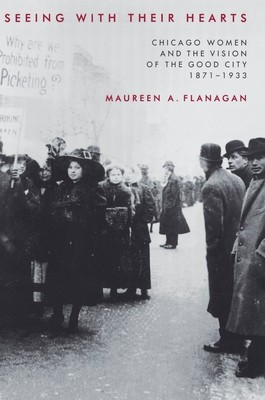
- We will send in 10–14 business days.
- Author: Maureen A Flanagan
- Publisher: Princeton University Press
- ISBN-10: 0691095396
- ISBN-13: 9780691095394
- Format: 16.2 x 24.4 x 2.6 cm, hardcover
- Language: English
- SAVE -10% with code: EXTRA
Reviews
Description
At the turn of the last century, as industrialists and workers made Chicago the hardworking City of Big Shoulders celebrated by Carl Sandburg, Chicago women articulated an alternative City of Homes in which the welfare of residents would be the municipal government's principal purpose. Seeing With Their Hearts traces the formation of this vision from the relief efforts following the Chicago fire of 1871 through the many political battles of the Gilded Age and Progressive Era. In the process, it presses a new understanding of the roles of women in public life and writes a new history of urban America.
Heeding the call of activist Louise de Koven Bowen to become third-class passengers on the train of life, thousands of women "put their shoulders to the wheel and their whole hearts into the work" of fighting for better education, worker protections, clean air and water, building safety, health care, and women's suffrage. Though several well-known activists appeared frequently in these initiatives, Maureen Flanagan offers compelling evidence that women established a broad and durable solidarity that spanned differences of race, class, and political experience. She also shows that these women--emphasizing their common identity as women seeking a city amenable to the needs of women, children, families, and homes--pursued a vision and goals distinct from the reform agenda of Progressive male activists. They fought hard and sometimes successfully in a variety of public places and sites of power, winning victories from increased political clout and prenatal care to municipal garbage collection and pasteurized milk. While telling the fascinating and in some cases previously untold stories of women activists during Chicago's formative period, this book fundamentally recasts urban social and political history.EXTRA 10 % discount with code: EXTRA
The promotion ends in 19d.20:43:01
The discount code is valid when purchasing from 10 €. Discounts do not stack.
- Author: Maureen A Flanagan
- Publisher: Princeton University Press
- ISBN-10: 0691095396
- ISBN-13: 9780691095394
- Format: 16.2 x 24.4 x 2.6 cm, hardcover
- Language: English English
At the turn of the last century, as industrialists and workers made Chicago the hardworking City of Big Shoulders celebrated by Carl Sandburg, Chicago women articulated an alternative City of Homes in which the welfare of residents would be the municipal government's principal purpose. Seeing With Their Hearts traces the formation of this vision from the relief efforts following the Chicago fire of 1871 through the many political battles of the Gilded Age and Progressive Era. In the process, it presses a new understanding of the roles of women in public life and writes a new history of urban America.
Heeding the call of activist Louise de Koven Bowen to become third-class passengers on the train of life, thousands of women "put their shoulders to the wheel and their whole hearts into the work" of fighting for better education, worker protections, clean air and water, building safety, health care, and women's suffrage. Though several well-known activists appeared frequently in these initiatives, Maureen Flanagan offers compelling evidence that women established a broad and durable solidarity that spanned differences of race, class, and political experience. She also shows that these women--emphasizing their common identity as women seeking a city amenable to the needs of women, children, families, and homes--pursued a vision and goals distinct from the reform agenda of Progressive male activists. They fought hard and sometimes successfully in a variety of public places and sites of power, winning victories from increased political clout and prenatal care to municipal garbage collection and pasteurized milk. While telling the fascinating and in some cases previously untold stories of women activists during Chicago's formative period, this book fundamentally recasts urban social and political history.

Reviews